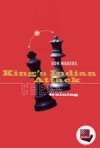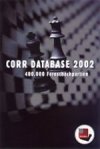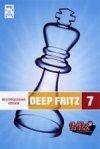 |
ChessBase Reviews |
Last updated 19th October 2002

| index |
CDs, DVDs, Software Part 10

King’s Indian Attack by Don Maddox
Don Maddox co-authored the Bluebook Guide to the Winning with the King’s Indian Attack, and has taught and played the King’s Indian Attack extensively. He is a strong correspondence player so our readers should find his insights useful.
This is a nice CD for those of you looking for a variable opening system which is easy to learn. White aims to play a King’s Indian with white and begins with the flexible moves of Nf3, d3, g3 and e4. These can be used whatever Black plays but most players seem to prefer to use the system against the French Defence, Sicilian Defence or Caro-Kann. Probably the only response by Black which prevents White from steering their opponent into King’s Indian Attack waters is 1... d5, but then I suppose we can’t have everything our own way. The opening affords many opportunities for transposition but these are all well covered on the CD by the author.
On this CD the author discusses the basic principles of the King’s Indian Attack , standard structures, and top players who have contributed to King’s Indian Attack theory - from both the white and black sides. The CD contains more than 20,000 games (740+ annotated), a complete King’s Indian Attack tree, and a King’s Indian Attack training database. The text introductions are extensive. Once again I found games from our members on this CD. Here's one played by Douglas Bryson:
D Walker (2300) - D Bryson (2380) [A08] Tyneside International Newcastle, 28.05.1995
1.Nf3 d5 2.g3 Nf6 3.Bg2 e6 4.0–0 Be7 5.d3 c5 6.Nbd2 Nc6 7.e4 0–0 8.Re1 b5
9.e5 Nd7 10.Nf1 a5 11.h4 b4 12.Bf4 Ba6 13.Ne3 a4 14.c4 bxc3 15.bxc3 Qa5 16.c4
dxc4 17.Nxc4 Bxc4 18.dxc4 Rad8 19.Qc2 Nd4 20.Nxd4 cxd4 21.Reb1 Bb4 22.a3 Bc3
23.Rb5 Qc7 24.Rd1 Qxc4 25.Bf1 Qc8 26.Qxa4 Qa8 27.Qb3 Rb8 28.Rb1 Rxb5 29.Qxb5
Rb8 30.Qxb8+ Nxb8 31.Bg2 Nc6 32.Bxc6 Qd8 33.Be4 h6 34.h5 Ba5 35.Rb7 d3 36.Bd2
Bb6 37.a4 Qd4 38.Rb8+ Bd8 39.a5 Qxe4 40.Rxd8+ Kh7 41.Rd7 Qe2 42.Bf4 Qa2 43.Kg2
Qxa5 44.Rxd3 Qa4 45.Re3 Qd1 46.f3 Qc2+ 47.Kh3 Qf5+ 48.Kg2 Qxh5 49.Re4 Qg6
50.Be3 Kh8 51.Bd4 Qh7 52.Bb6 h5 53.Ba7 Qf5 54.Be3 Kh7 55.Kf2 Kg8 56.Kg2 Kf8
57.Bc5+ Ke8 58.Bd6 Kd7 59.Rc4 Kd8 60.Rb4 g5 61.Rc4 g4 62.fxg4 hxg4 63.Rf4 Qh5
0–1

King’s Indian with h3 by Martin Breutigam
The King’s Indian Defence has been one of my favourite openings. However good plans for White are becoming ever more prevalent and this CD will be an excellent addition to your library for those of you looking to cause players such as myself as much grief as possible.
With h2-h3 White’s main idea is to support an earlier g2-g4 and ensure a save haven for White’s bishop on e3 by preventing Black from playing Ng4. The system with h3, which offers White many tactical possibilities, has been proven to be quite successful in practice. White scores a solid 60 percent of all points. One of the greatest players of this system is doubtlessly Michal Krasenkow. He has used it in hundreds of his games, and with great success. Against the King's Indian Krasenkow has achieved the incredible score of over 80%.
White's options are many and flexible. After opening the g-file with an exchange on f5 he often gets good chances to attack on the g-file. But he may also close the position on the kingside and use his superiority on the queenside to good effect. Black's counterplay is almost always based on the f5 push, which initialises the fight for the strategically important square e4. In any case Black must play actively and precisely if he does not want to be forced into inactivity and immobility.
The CD contains excellent introduction material and first class detailed theoretical analyses! It covers the variations E71: 5.h3 (without Nf3), E90: 5.Nf3 0-0 6.h3, E91: 5...Bg4 6.Be2 0-0 and has over 10,000 games and a training database with 20 training tests to assess your understanding of what you have learned. Here's one of the games on the CD played between Richard James and Allan Petrie:
C R James - A R Petrie [E90] Corr, 1995
1.d4 Nf6 2.Nf3 d6 3.c4 g6 4.h3 Bg7 5.d5 0–0 6.Nc3 c6 7.e4
e5 8.Bg5 Bd7 9.g4 h6 10.Bxf6 Bxf6 11.Be2 Na6 12.Qd2 Bg7 13.g5 hxg5 14.Nxg5 Bh6
15.h4 f6 16.Rg1 fxg5 17.hxg5 Bg7 18.dxc6 Bxc6 19.a3 Nc5 20.Qc2 Qb6 21.Rb1 Nb3
22.Bg4 Nd4 23.Qd3 Nb3 24.Be6+ Rf7 25.Qf3 Raf8 26.Rh1 Bd7 27.Qh3 Qxf2+ 0–1

Corr Database 2002 by ChessBase
Corr Database is an extensive collection of correspondence games, featuring classical correspondence games played by mail as well as E-mail games. The CD contains 400,000, compared to just over 295,000 on the previous Corr Database 2000. 1171 of the games contain excellent annotations.
Games incorporated range from 1804 until 2002 including all games of the correspondence chess world championships 1-6, correspondence chess Olympics 1-14, correspondence chess European championships 1-6, national championships (AUS, CSR, DEN, GER, NED, SCO, USA), memorials (1965 SUI jub75), 1991 FIN jub30, Ned jub25 and 2001 SCO jub21) and regional championships (Pan American, Pacific area, Baltic Sea 1-7).
For the first time, Corr2002 also features a correspondence chess playbase (for ChessBase 8.0), which includes about 41,000 names. The CD is a must for every serious player of correspondence chess! There are lots of games on this CD from our members and here is one where Alan Brown managed to get the better of Ian Reeman:
I F Reeman (2204) - A C Brown (2271) [B17] SCCA-Championship 01/02
1.e4 c6 2.d4 d5 3.Nc3 dxe4 4.Nxe4 Nd7 5.Nf3 Ngf6 6.Ng3 e6
7.Bd3 Bd6 8.0–0 0–0 9.c4 e5 10.c5 Bb8 11.Be3 exd4 12.Bxd4 b6 13.Ne4 Nd5 14.Re1
f5 15.Nc3 bxc5 16.Bc4 Bb7 17.Be3 N7b6 18.Qd3 Bd6 19.Bg5 Qd7 20.Bb3 Rae8
21.Rad1 Kh8 22.h3 h6 23.Bc1 Rxe1+ 24.Rxe1 Nb4 25.Qd2 c4 26.Bc2 Rd8 27.Kf1 Ba6
28.Qe2 Nd3 29.Nh4 Qf7 30.Rd1 Nd5 31.Qf3 Rf8 32.Nxd5 cxd5 33.Kg1 Kh7 34.g3 Be7
35.Bxd3 cxd3 36.Ng2 d4 37.b3 Bb4 38.Nf4 Re8 39.Qc6 Bb7 40.Qb5 Bc3 41.Kh2 g5
42.Nxd3 Re2 43.a3 Qd5 44.Qxd5 Bxd5 45.Rf1 Bxb3 0–1
And here's a game played between John Findlay and Simon Gillam:
J A Findlay - S R Gillam (2385) [B06] SCCA-ch 9899 corr, 1998
1.e4 g6 2.d4 Bg7 3.c3 d6 4.f4 Nf6 5.e5 dxe5 6.fxe5 Nd5 7.Bc4 0–0 8.Nf3 c5
9.dxc5 Be6 10.Qd4 Nc6 11.Qe4 Na5 12.Nbd2 Nxc4 13.Nxc4 Rc8 14.Ng5 Bf5 15.Qh4 h6
16.Nf3 Rxc5 17.0–0 Bd3 18.Qd4 Bxf1 19.Qxc5 Bxc4 20.Qxc4 e6 21.Qd4 Qb6 22.Qxb6
Nxb6 23.Be3 Nc4 24.Bd4 a6 25.b3 Na5 26.Bb6 Nc6 27.Re1 Rc8 28.Kf2 Kf8 29.Kg3
Nb8 30.c4 Nd7 31.Bd4 Ke8 32.Rd1 Rd8 33.Bc3 Nc5 34.Rxd8+ Kxd8 35.Bd4 Nd3 36.a3
Kd7 37.b4 b5 38.cxb5 axb5 39.Bc3 Kc6 40.Nd4+ Kd5 41.Nxb5 Kc4 42.a4 Nxb4 43.Ba1
Nc2 44.Nd6+ Kb4 45.Bb2 ½–½

Deep Fritz 7 by ChessBase
Deep Fritz is the multi-processor version of Fritz7, which leads the world ranking list since four years. Deep Fritz 7 will run in computers with between one and eight processors. On a dual system the increase in speed is around 85% compared to a single processor of equivalent speed. But even if you have a single processor system the playing strength is greater than that of the regular Fritz7. The "Deep" version has been improved and enhanced, it has more positional understanding and additional endgame knowledge. This has been achieved without diminishing the program’s legendary tactical power. Deep Fritz 7 comes with the full Fritz7 interface and gives you full access to the Playchess server. Available in the following languages: English and German. Recently Deep Fritz 7 won the famous CSVN computer chess tournament in Leiden.
World Chess Champion Vladimir Kramnik is currently battling against Deep Fritz and it will be the turn of Gary Kasparov shortly as a match between him and Deep Fritz is planned for later in the year. Here are a couple of games played by Deep Fritz, the first being from game one of the Vladimir Kramnik match.
Deep Fritz (2807) - V Kramnik [C67] Brains in Bahrain Man-Machine Match. Manama (1), 04.10.2002
1.e4 e5 2.Nf3 Nc6 3.Bb5 Nf6 4.0-0 Nxe4 5.d4 Nd6 6.Bxc6 dxc6 7.dxe5 Nf5
8.Qxd8+ Kxd8 9.Nc3 h6 10.b3 Ke8 11.Bb2 Be7 12.Rad1 a5 13.a4 h5 14.Ne2 Be6
15.c4 Rd8 16.h3 b6 17.Nfd4 Nxd4 18.Nxd4 c5 19.Nxe6 fxe6 20.Rxd8+ Kxd8 21.Bc1
Kc8 22.Rd1 Rd8 23.Rxd8+ Kxd8 24.g4 g6 25.h4 hxg4 26.Bg5 Bxg5 27.hxg5 Ke8
28.Kg2 ½-½
Gambit Tiger 1.0 - Deep Fritz [D47] Cadaqués 2001 (12), 29.01.2001
1.d4 d5 2.c4 c6 3.Nf3 Nf6 4.Nc3 e6 5.e3 Nbd7 6.Bd3 dxc4 7.Bxc4 b5 8.Bd3 Bb7
9.a3 b4 10.Ne4 Nxe4 11.Bxe4 bxa3 12.bxa3 Bd6 13.Rb1 Qc7 14.Ng5 Rb8 15.Qh5 g6
16.Qh6 Bf8 17.Qh4 Be7 18.f4 h6 19.Qh3 c5 20.0–0 Bxg5 21.Rxb7 Rxb7 22.fxg5 Rb6
23.Bd2 Qd6 24.Ba5 Rb3 25.dxc5 Qxc5 26.Bxg6 Rxe3 27.Bxf7+ Ke7 28.Bb4 Rxh3+
29.Bxc5+ Nxc5 30.gxh3 hxg5 31.Bg6 Nd7 32.Rf7+ Kd6 33.Kg2 a5 34.Bh7 Rc8 35.Rf3
Ne5 36.Rb3 Kd5 37.a4 Rc4 38.Rb5+ Rc5 39.Rb6 Nc6 40.Bg6 Nd4 41.Ra6 Kc4 42.Rb6
Kc3 43.Kf2 Rc8 44.Rb7 Rf8+ 45.Kg2 Rh8 46.Kg3 Rh4 47.Be8 e5 48.Ra7 Kb4 49.Rb7+
Ka3 50.Kg2 e4 51.Re7 Rf4 52.Re5 Nf3 53.Rc5 Nh4+ 54.Kg1 Rf8 55.Bb5 Rf5 56.Rxf5
Nxf5 57.Kf2 Kb4 58.Bd7 Ne7 59.Ke3 Nd5+ 60.Kd4 e3 61.Kd3 Kc5 62.Be8 Kd6 63.Bf7
Ke5 64.Bg8 Nf6 65.Bf7 Kf4 66.Ke2 Ne4 67.Be8 Nc3+ 68.Ke1 Ke4 69.Bd7 e2 70.Kf2
Kd3 71.Ke1 Ke3 72.Bc6 Na2 73.Bb5 Nc1 74.Bc4 Nd3+ 75.Bxd3 Kxd3 76.h4 gxh4 77.h3
Kc3 78.Kxe2 Kb4 79.Kd3 Kxa4 80.Kc4 Ka3 81.Kc3 a4 0–1